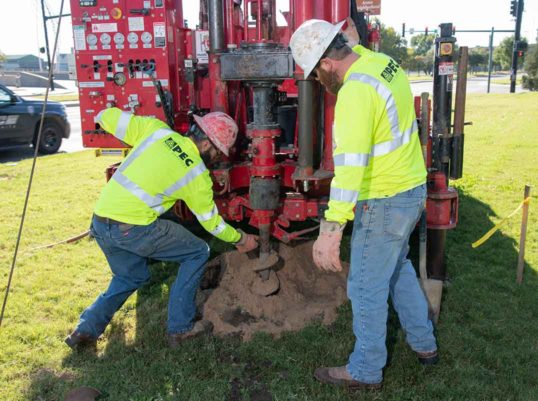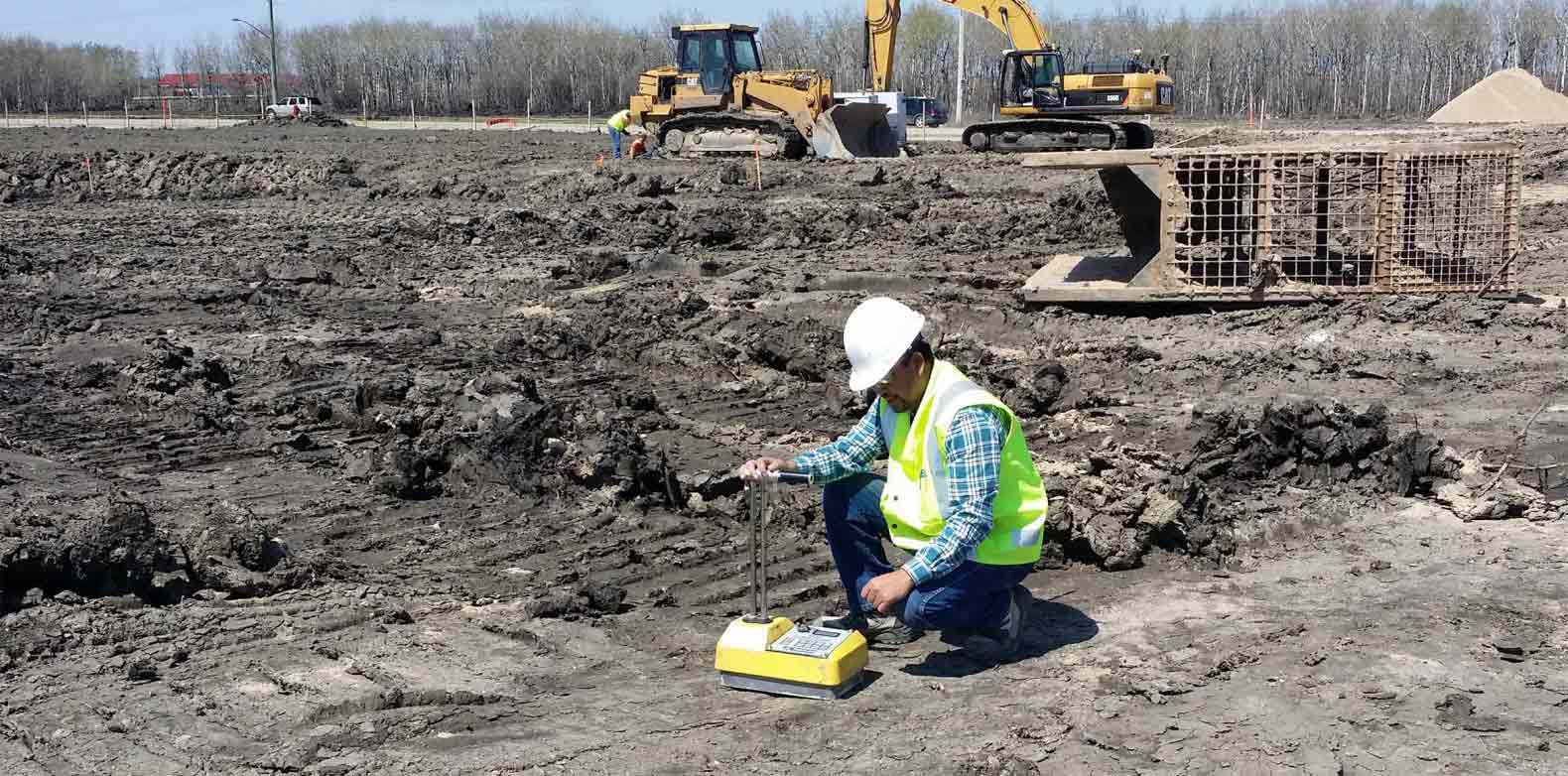Leading Geotechnical Engineers for Cutting-Edge Soil Analysis and Structure Design
Recognizing the Essential Role of the Geotechnical Industry in Modern Construction Projects and Facilities Growth
The geotechnical sector is a foundation of modern-day building and construction and infrastructure development, providing important understandings right into soil actions that directly affect project end results. Through sophisticated dirt analyses and cutting-edge design solutions, geotechnical specialists not only guarantee architectural integrity yet additionally address sustainability problems amid evolving ecological requirements.
Significance of Dirt Analysis
Soil analysis plays an essential duty in the geotechnical industry, working as the foundation for educated decision-making in building projects. Precise soil analysis is necessary for identifying the suitability of a site for numerous sorts of frameworks, consisting of residential homes, industrial buildings, and bridges. By examining dirt make-up, toughness, moisture, and density material, designers can expect prospective obstacles and alleviate threats connected with ground instability, disintegration, and settlement.
The analysis procedure typically entails a collection of examinations and observations that give crucial details concerning the subsurface conditions. This data notifies the style and building processes, making sure that structures are improved strong ground with adequate assistance. Additionally, recognizing the soil profile makes it possible for designers to select proper construction methods and products, enhancing resource utilization and minimizing prices.
Along with guaranteeing structural stability, soil evaluation adds to environmental sustainability. By recognizing potential contamination or damaging results on bordering environments, engineers can execute methods to safeguard these natural deposits. In general, extensive soil evaluation is important in the geotechnical field, underpinning the safety, performance, and environmental obligation of building and construction projects.
Secret Geotechnical Methods
A variety of crucial geotechnical methods are utilized to boost the security and examine and efficiency of building sites. One foundational method is soil sampling and screening, which enables designers to establish the chemical and physical homes of the ground. This details is vital for making educated choices pertaining to structure style and construction techniques.
An additional necessary strategy is site characterization, which involves the thorough assessment of soil and rock problems with methods such as borehole boring and in-situ testing. Methods like Requirement Penetration Examinations (SPT) and Cone Penetration Examinations (CPT) offer beneficial data on soil strength and stratigraphy.
Ground enhancement methods, such as soil stabilization and grouting, are likewise vital in improving the load-bearing ability of weak dirts. These approaches can reduce negotiation and enhance total website conditions.
Additionally, incline security analysis is vital for determining possible landslide dangers and making sure the safety of excavations. This evaluation commonly utilizes mathematical modeling and limit balance methods to forecast soil actions under various conditions.
Integrating these geotechnical methods into building and construction planning not only enhances task outcomes yet additionally makes certain the long-term sustainability of facilities growth.
Influence on Construction Safety And Security

Furthermore, efficient geotechnical design entails implementing mitigation approaches for Check This Out recognized dangers. This might consist of soil stabilization strategies, keeping frameworks, or drainage systems to alleviate hydrostatic stress. By attending to these elements, building groups can decrease the likelihood of crashes and enhance employee security.
Furthermore, continuous surveillance of site conditions is important throughout construction. Geotechnical instruments can provide real-time data pertaining to ground activity and security, enabling timely treatments when required.
Essentially, the geotechnical market plays an essential duty in protecting construction jobs. By focusing on ground honesty and utilizing extensive assessment techniques, the geotechnical sector not just safeguards the labor force however likewise adds to the durability and dependability of created framework.
Sustainability in Geotechnical Practices

Additionally, geotechnical designers are currently utilizing advanced innovations, such as geosynthetics, which enhance dirt stability while decreasing the volume of product required. This not just conserves resources yet likewise causes much less waste generation (geo tech engineer). The combination of lasting design principles right into geotechnical engineering urges the usage of renewable resource sources in construction processes, additionally minimizing carbon exhausts
In addition, complete website analyses are necessary for recognizing potential ecological impacts before construction begins. By performing these evaluations, geotechnical specialists can create methods that minimize unfavorable effects, ensuring conformity with ecological policies. In general, the emphasis on sustainability within geotechnical methods not just adds to the long go to this website life and strength of facilities but additionally advertises an accountable method to land and resource administration. This commitment is important for promoting lasting advancement in the modern construction landscape.
Future Trends in Geotechnical Engineering
Advancement is driving the future of geotechnical engineering, as emerging technologies and methods improve the sector. The integration of advanced information analytics and expert system is readied to reinvent site examination and danger assessment, making it possible for designers to make more enlightened choices based upon real-time information. In addition, the use of geosynthetic products is gaining traction, supplying sustainable remedies that enhance soil security and lower environmental impact.
Another substantial fad is the fostering of automated and robot systems for tracking and building procedures. These modern technologies not only enhance accuracy however likewise improve security by lessening human involvement in hazardous environments. Furthermore, the application of Structure Information Modeling (BIM) in geotechnical layout facilitates improved collaboration among stakeholders, optimizing job distribution and minimizing expenses.
As climate adjustment presents brand-new difficulties, the industry is increasingly concentrating on strength and versatility in layout techniques, making sure facilities can endure severe weather condition events. The ongoing fad toward sustainability will drive advancement in green materials and approaches, straightening geotechnical design with more comprehensive ecological objectives. Jointly, these trends will certainly form an extra reliable, lasting, and durable geotechnical landscape for future tasks.
Verdict

The geotechnical market is a cornerstone of contemporary building and construction and framework advancement, giving crucial understandings into soil habits that straight influence task outcomes. my blog geotechnical engineers.Soil assessment plays an important duty in the geotechnical market, offering as the structure for notified decision-making in building and construction tasks. Generally, thorough dirt evaluation is indispensable in the geotechnical field, underpinning the safety, performance, and ecological duty of construction tasks
Building security is considerably affected by geotechnical practices, as the stability and stability of the ground directly influence the general security of a building and construction site.In conclusion, the geotechnical sector is essential in modern construction and framework development, providing vital assessments that guarantee architectural integrity and safety.